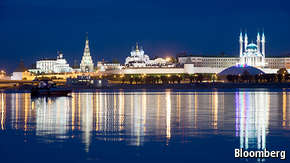Welcome to DU!
The truly grassroots left-of-center political community where regular people, not algorithms, drive the discussions and set the standards.
Join the community:
Create a free account
Support DU (and get rid of ads!):
Become a Star Member
Latest Breaking News
General Discussion
The DU Lounge
All Forums
Issue Forums
Culture Forums
Alliance Forums
Region Forums
Support Forums
Help & Search
Religion
Related: About this forumRussians feel less positive towards religion now than they did in 1990

Jul 31st 2015, 14:09 by ERASMUS
OVER the quarter-century since the collapse of the Soviet system, Russian feelings about religion have changed a lot, as one might imagine. In Soviet times, the state expected and encouraged citizens to be atheists. Now a loose affiliation to a religious faith has become the national default mode; a plurality of Russians tell pollsters they are Russian Orthodox, while significant minorities identify with Islam, Buddhism or Judaism.
But a survey published a few days ago (link in Russian) by one of Russia's best-known pollsters, VTSIOM, showed something unexpected in its comparison of present-day attitudes in Russia with those of 1990. Although there is a jump (from 23% to 55%) in the share of people who say they are sometimes "helped" by religion in their own lives, the general effect of religion on human welfare is viewed in much bleaker terms than before. The proportion of people who think religion does more good than harm to society has slumped from 61% to 36% while the share detecting more harm than good has risen from 5% to 23%.
One can guess at least part of what is going on here. In 1990, many Russians saw religion in the same rosy glow in which they saw everything non-Soviet, from rock music to fast food to monarchism. If the Soviet Union had been against it, they were for it—or thought it at least worth a try. Religion seemed daring, different and exotic. The Soviet system did tolerate religious structures, including the Russian Orthodox hierarchy, as long as they were loyal to the state, but they were pretty weak. Since then the visible strength and privilege of officially-blessed faiths (mainly but not only Orthodox Christianity) has grown enormously. Religion is viewed as a partner in power, and not in any sense counter-cultural.
In presenting the figures, the pollster observed that around 1990, religion had for a time become a "widespread social fashion" after the limits on its practice were lifted. Since then, people have learned to distinguish faith as such, which many still find personally meaningful, from religion as an institution, which many view critically. The fact that radical Islamist movements, barely on Russians' radar in 1990, have since become a major security threat may also play a role.
http://www.economist.com/blogs/erasmus/2015/07/religion-russia
TL/DR: "Religion is viewed as a partner in power"
InfoView thread info, including edit history
TrashPut this thread in your Trash Can (My DU » Trash Can)
BookmarkAdd this thread to your Bookmarks (My DU » Bookmarks)
5 replies, 889 views
ShareGet links to this post and/or share on social media
AlertAlert this post for a rule violation
PowersThere are no powers you can use on this post
EditCannot edit other people's posts
ReplyReply to this post
EditCannot edit other people's posts
Rec (0)
ReplyReply to this post
5 replies
 = new reply since forum marked as read
Highlight:
NoneDon't highlight anything
5 newestHighlight 5 most recent replies
= new reply since forum marked as read
Highlight:
NoneDon't highlight anything
5 newestHighlight 5 most recent replies
Russians feel less positive towards religion now than they did in 1990 (Original Post)
rug
Aug 2015
OP
when Coors beer was unavailable in parts of the US, some people went to extremes to get it
HFRN
Aug 2015
#1
Quite a come down from the opiate of the masses to the cheap, weak beer of the masses. n/t
Silent3
Aug 2015
#5
HFRN
(1,469 posts)1. when Coors beer was unavailable in parts of the US, some people went to extremes to get it
but many of the same people, once it showed up in every store they visited, never bought it again
rug
(82,333 posts)2. That observation fits nicely.
Silent3
(15,265 posts)5. Quite a come down from the opiate of the masses to the cheap, weak beer of the masses. n/t
pinto
(106,886 posts)3. I wonder how much Putin plays in this. I think he'd love to see an offical Russian Orthodox state.
While a whole new post Soviet generation looks to the West, especially Europe, as a model for the future, the Orthodox church remains extremely conservative, nationalistic and isolationist. They may be taking a hard second or third look at the role the church has in relation to the state.
rug
(82,333 posts)4. The closer Kirill gets to Putin, the further the people step back.
He's a big proponent of symphonia.
https://en.wikipedia.org/wiki/Symphonia_(theology)